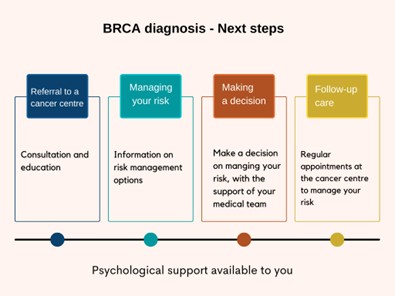Telling people about your increased risk of cancer can be very difficult. It can be hard to find the words. You may also have feelings such as guilt, sadness or anxiety before or after the conversation.
Your genetic counsellor will give you advice about how to tell family members about your genetic test result. They can also give you a letter with information on your BRCA test results, which you can show to your family.
Support for conversations about BRCA
- Talk to our cancer nurses
- Take part in free counselling from the Irish Cancer Society
- Join a support group. Call our Support Line for information on support near you.



